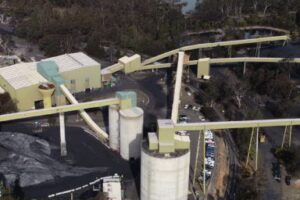
The United Kingdom’s former director general for AUKUS has scored a top job with controversial tech firm Palantir.
The senior Ministry of Defence alumnus, Damian Parmenter, sought advice from a UK ethics watchdog before joining Palantir. In advice written in June and made public earlier this week, the Advisory Committee on Business Appointments warned there were several “risks” inherent in the new gig.
Among them is Parmenter’s potential access to a rolodex of top AUKUS officials, “especially in the US and Australia”, according to the committee.
“The committee considered it is likely that Mr Parmenter would have amassed a network of contacts while in office, especially in the US and Australia by virtue of his role at AUKUS,” the advice said. “As such, there is a risk these contacts gained in office, but outside of the UK government, may be seen to offer new business development opportunities for Palantir only gained by virtue of his position representing the UK on AUKUS matters.”
Related Article Block Placeholder
Article ID: 1213282
Asked for comment, a Palantir spokesperson said Parmenter would comply with all conditions set out by the committee, including a two-year moratorium on him lobbying or using contacts he developed in government.
Independent. Irreverent. In your inbox
Get the headlines they don’t want you to read. Sign up to Crikey’s free newsletters for fearless reporting, sharp analysis, and a touch of chaos
By continuing, you agree to our Terms & Conditions and Privacy Policy.
“Damian will comply fully with the conditions set out by the committee, just as Palantir requires all staff to adhere to any business appointment rules advice,” the spokesperson said.
On LinkedIn, Parmenter describes his role at Palantir, which he joined in July, as “senior counselor” and a London-based “international defence and security adviser”. There is no mention of his previous role as the UK’s director general of AUKUS, only that he was a “strategist” for “government”.
According to the Advisory Committee on Business Appointments, Parmenter described his new position as “a senior advisory role that includes providing ‘decision support’ to the UK Head of Palantir on international defence and security issues and focused on international opportunities within Europe and the Indo-Pacific”.
As AUKUS director general, Parmenter was responsible for “cohering the wider AUKUS domestic and international community” and driving “AUKUS policy and strategy in line with the UK’s wider foreign and security policy objectives”, in the words of the Oxford University-based Emerging Threats Working Group.
In that role, which Parmenter held from 2023 to earlier this year, he met with many of the most powerful people in the Australian defence sphere.
Related Article Block Placeholder
Article ID: 1218909
Among them are several top ministers in the Albanese government. In March last year, Parmenter was part of a visiting delegation from the UK that attended ministerial consultations in Adelaide alongside then secretary of state and former prime minister David Cameron and other top UK officials. On the Australian side, the participants included Defence Minister Richard Marles, Foreign Affairs Minister Penny Wong, the secretaries of the departments of Foreign Affairs and Trade and Defence, the chief of the Australian Defence Force, and the Australian high commissioner to the UK.
A few months later, at Western Australia’s HMAS Stirling naval base, Parmenter fronted a press conference alongside Defence Personnel Minister Matt Keogh, Resources Minister Madeleine King and Rear Admiral Richard Seif, the commander of the US Submarine Force.
Palantir, a US-based data analysis and tech company, was founded by billionaire Peter Thiel and three others. As Crikey reported in July, Palantir’s Australian government clients include the Department of Defence, the Australian Criminal Intelligence Commission and the Australian Signals Directorate. Its corporate clients include Coles, Rio Tinto and Westpac.
The company has gained notoriety for its work with the military and assisting with government surveillance schemes, and has recently made headlines for reportedly supporting the Israeli Defence Forces with what a United Nations report called “automatic predictive policing technology” and “real-time battlefield data integration for automated decision-making”.





